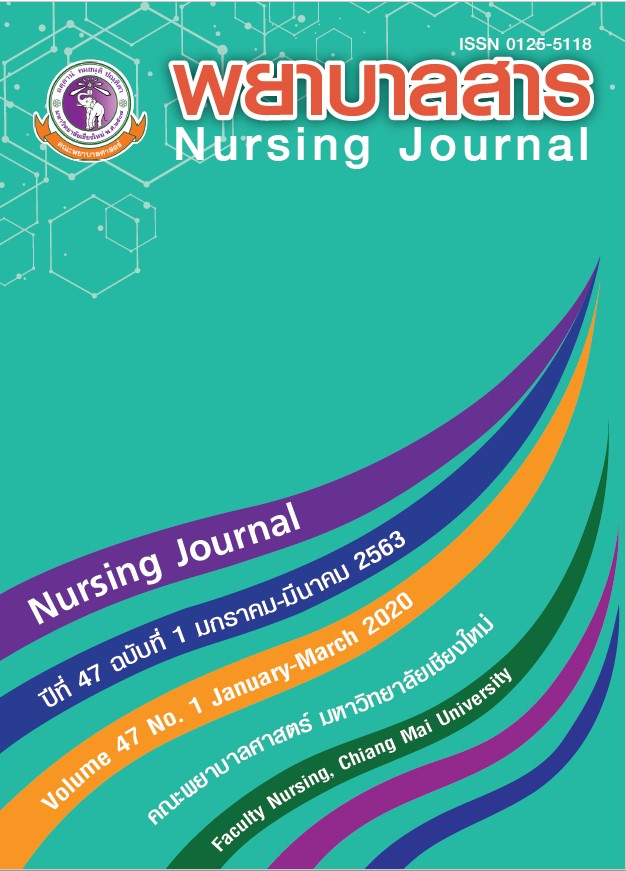Lanna Local Wisdom in Promoting the Elderly Well-being: A Pilot Study
Keywords:
Lanna local wisdom, Caring for elderly health, Health promotionAbstract
Lanna local wisdom related to health is knowledge through accumulated experiences focusing on health stability and placing value on holistic health. The main purpose of this qualitative descriptive study was to explore Lanna local wisdom in promoting, protecting, and caring for elderly health. Key informants, a total of 68, were tradition scholar, traditional healer, and the elderly, residing in Chiang Mai and Lumphun Province. Data were obtained through focus group discussions and in-depth interviews. Content analysis was utilized for data analysis.
The main results illustrated that Lanna elderly care including health promotion and protection were an integral part of daily life. The spirit beliefs and all kinds of rituals were incorporated to elderly care for their physical and emotional well-being. The main principle of caring was five notions to live longer, starting with food: natural and nontoxic, exercise and activities based on their lifeway, emotion: morale to spiritual joyfulness, fresh air, and caring each other. Regarding specific rituals, these included Seub Chata, and Songkaeu-buchatean. Concerning therapeutic therapy, while the elderly got sick, folk remedies including herbal remedies and therapeutic rites were adopted. These remedies were caring for both physical and mind as the holistic health concept. These results are useful for elderly care plan including health promotion and remedies integrating local and universal wisdom and gaining ‘contemporary health care suitable to social and cultural context in the globalization era.
References
Chanprasit, C., Lertpoonwilaikul, W., Pothiban, L., Panuthai, S., & Sucumwang, K. (2005).Health seeking behaviors among the elderly in muang district Ch iang Mai. Nursing Journal,32 (2), 72-83. (In Thai)
Department of Health, Ministry of Public Health. (2012). Home care for older persons in communities. Retrieved from https://spkhp.files.wordpress.com/2016/01/manual -elderlycare-volunteer.pdf (In Thai)
Foundation of Thai Gerontology Research and Development institute. (2017). Situation of Thai ederly 2017. Retrieved from http://www.dop.go.th/download/knowledge/th1552463947-147_0.pdf (In Thai)
Jeste, D. V., Ardelt, M., Blazer, D., Kraemer, H. C., Vaillant, G., & Meek, T. W. (2010). Expert consensus on characteristics of wisdom: A delphi method study. The Gerontologist, 50 (5), 668-680.
Jiménez-Martin, P. J., Meléndez-Ortega, A., Albers, U., & Schofield, D. (2013). A review of Tai Chi Chuan and parameters related to balance. European Journal of Integrative Medicine, 5, 469-475.
Jitapunkul, S., & Wivatvanit, S. (2009). National policies and programs for the aging population in Thailand. Ageing International, 33, 62-74.
Ketprom, S. (2008). Urban lifestyle. Chiang mai: Saraphi Printing. (In Thai)
Leininger, M. (1991). Cultural care diversity and universality: A theory of nursing. New York:League for Nursing.
Li, F., Harmer, P., McAuley, E., Duncan, T. E., Duncan, S. C., Chaumeton, N., & Fisher, K. J.(2001). An evaluation of the effects of Tai Chi exercise on physical function among older persons: A randomized controlled trial. Annals of Behavioral Medicine, 23(2), 139-146.
Miller, S. M., & Taylor-Piliae, R. E. (2013). Effects of Tai Chi on cognitive function in community-dwelling older adults: A review. Geriatric Nursing, 35 (1), 9-19.
Ministry of Public Health. (2017). New paradigm to drive healthcare system. Retrieved from http://envocc.ddc.moph.go.th/uploads/Occupational%20Health/MOH%20SEM%201-4/2/2.5%20Env.-Occ%204.0.pdf
Office of the National Economic and Social Development Council. (2007). Thailand population predictions 2000-2030. Retrieved from http://hpc5.anamai.moph.go.th
Pesek, T., Reminick, R., & Nair, M. (2010). Secret of long life: Cross-cultural explorations in sustainably enhancing vitality and promoting longevity via elders’ practice wisdom. Explore, 6(6), 352-358.
Ratchakitcha. (2007). National heath act 2007. Retrieved from http://www.thailaws.com/law/thaiacts/code1667.pdf
Ratchakitcha. (2011). National economic and social development plan no. 11 (2012-2016). Retrieved from http://www.ratchakitcha.soc.go.th/DATA/PDF/2554/E/152/1.PDF (In Thai)
Taoprasert, S. (2003). Way of health maintenance in the Lanna folk medicine system.Bangkok: Wanida. (in Thai)
Thongsaew, N., Sethabouppha, H., & Chanprasit, C. (2011). “Lann a” local wisdom for health care among people with alcohol dependence. Nursing Journal, 38 (3), 110-121. (in Thai)
Tyrovolas, S., & Panagiotakos, D. B. (2010). The role of Mediterranean type of diet on the development of cancer and cardiovascular disease, in the elderl y: a systematic review.Maturitas, 65, 122-130.
Wongkwanklom, M., Sethabouppha, H., & Chanprasit, C. (2011). Isan local wisdom for health care among persons with alcohol dependence. Nursing Journal, 38 (3), 122-133. (in Thai)
World Health Organization. (1986). Ottawa charter for health promotion. Retrieved from http://www.euro.who.int/__data/assets/pdf_file/0004/129532/Ott awa_ Charter.pdf
World Health Organization. (2010). Definition of an older or elderly person. Retrieved from http://www.who.int/healthinfo/survey/ageingdefnolder /en/print .html
Downloads
Published
How to Cite
Issue
Section
License
บทความที่ได้รับการตีพิมพ์เป็นลิขสิทธิ์ของวารสารพยาบาลสาร
ข้อความที่ปรากฏในบทความแต่ละเรื่องในวารสารวิชาการเล่มนี้เป็นความคิดเห็นส่วนตัวของผู้เขียนแต่ละท่านไม่เกี่ยวข้องกับมหาวิทยาลัยเชียงใหม่ และคณาจารย์ท่านอื่นๆในมหาวิทยาลัยฯ แต่อย่างใด ความรับผิดชอบองค์ประกอบทั้งหมดของบทความแต่ละเรื่องเป็นของผู้เขียนแต่ละท่าน หากมีความผิดพลาดใด ๆ ผู้เขียนแต่ละท่านจะรับผิดชอบบทความของตนเองแต่ผู้เดียว






